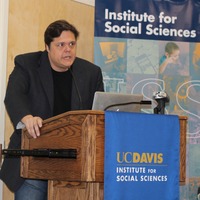The proliferation of smartphones and other personal electronics has led to a booming demand for rare earth minerals. Yet recent legal and corporate interventions designed to eliminate “conflict minerals” from high-tech supply chains have proven equally violent and destructive to people on the ground.
The proliferation of smartphones and other personal electronics has led to a booming demand for rare earth minerals. Yet recent legal and corporate interventions designed to eliminate “conflict minerals” from high-tech supply chains have proven equally violent and destructive to people on the ground.In his ISS Noon Lecture on Jan. 20, 2016, Associate Professor and Interim Chair in the UC Davis Department of Anthropology James Smith explored the intersection of technology, globalization, social justice and indigenous practices.
Smith's talk was entitled Getting the Blood Out of Your Cell Phone: Silicon Valley’s Efforts to Avoid 'Conflict Minerals' from the DR Congo. His fieldwork centers on the lived experience of miners—specifically small-scale or “artisanal” miners—in the eastern Democratic Republic of the Congo. He highlights the way their labor “connects to social fields that are global in scale.” The title of his talk thus has a dual meaning, invoking native beliefs that mined minerals require ritual purification as well as the fact that international trade in such resources generates brutal conflicts for control of their production.

Spiritual economy
The eastern DR Congo has abundant mineral resources essential for powering the digital age. NGOs call these the “3 Ts:” tantalum, tin, and tungsten ores. Artisanal miners, equipped with intimate knowledge of their homelands and able to read landscapes as a geological map, extract minerals using ancient rituals and techniques. These miners pay as much attention to the spiritual economy of a specific place as they do to the price of ore on international commodities exchanges.
Smith’s talk examined the miners’ “adaptive strategies for dealing with people who can bring them harm.” Industrial mineral extraction requires intensive inputs of labor and capital. To prevent those inputs coming from external interests, Congolese miners have collaborated—organizing, for example, to prevent large machines from being imported to remote mining locations.
False compliance
By revealing the human links in the commodity chain that connects Silicon Valley to artisanal mines in places like Bisie, Smith showed how corporate entities distort local social networks by dispossessing artisanal miners of their lands and pushing them into the regional militias that propagate violence in the DR Congo. He argued that NGOs and regulators operate under the “false principles of transparency”—nominally complying with international accords aimed at curtailing the trade in conflict resources, but replicating structures of violence and inequality in practice. Operating under a patina of compliance, large mining companies launder the “blood” from their commodity chains, all the while reinforcing a local economy of violence.
— Loren Michael Mortimer
This report originally appeared on the website of the UC Davis Institute for Social Sciences.
